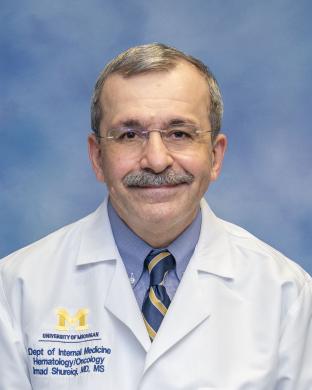Biography
"From my early clinical training in medical school, I saw how people suffered from cancer, and I always wished I could help them. There is a global effort toward a cure, but the need remains great, even today." Dr. Imad Shureiqi has dedicated his life's research work to contribute to ending this never-ending disease, and has focused much of his research on colon cancer, which remains prevalent in industrialized countries like the U.S. A hands-on physician-scientist, Dr. Shureiqi earned his MD in Medicine at Damascus University. He completed his Residency in Internal Medicine at State University of New York at Buffalo. He completed a Fellowship in Medical Oncology at the University of Michigan, where he began his research work on gastrointestinal and colon cancers. Here he also earned his M.S. in Clinical Trial Design and Statistical Analysis. He was recruited to M.D. Anderson in 1999, where he has served as an Assistant Professor and later as an Associate Professor, Departments of Clinical Cancer Prevention, Division of Cancer Prevention and Population Sciences and Gastrointestinal Medical Oncology, Division of Cancer Medicine. Dr. Shureiqi has been widely recognized and honored for his peer-reviewed research, academic leadership, and publications. He has served as the principal investigator for a series of NIH-funded studies during the last 20 years to define the role of lipid signaling in gastrointestinal carcinogenesis, especially 15-Lipoxygenase-1 (15-LOX-1) and PPAR-delta (PPARD). 15-LOX-1 is a critical enzyme for the production of various inflammation/terminal differentiation-regulatory lipid signaling mediators, including 13-S-hydroxyoctadecadienoic acid from linoleic acid, lipoxins from arachidonic acid, and resolvins from eicosapentaenoic and docosahexaenoic acids. Given the important regulatory function of 15-LOX-1 in terminal cell differentiation and inflammation, its expression is inducible and highly regulated in normal human cells. 15-LOX-1 is, however, down-regulated in various human cancers, esophageal, breast, and pancreatic. 15-LOX-1 re-expression via pharmaceutical agents or adenoviral vectors induces growth inhibition and reestablishes terminal differentiation and apoptosis in cancer cells. Dr. Shureiqi's research group was the first to identify PPARD, a lipid nuclear receptor transcriptional factor, as a downstream target of 15-lipoxygenase-1 in colonic tumorigenesis. In later studies, his group developed the first mouse model of targeted PPARD genetic disruption in intestinal epithelial cells to demonstrate PPARD modulation's effects in these cells on colonic tumorigenesis. Their more recent studies reported on the first intestinally targeted PPARD overexpression model, which showed the profound impact of PPARD on azoxymethane-induced colonic carcinogenesis and gastric carcinogenesis. Dr. Shureiqi has returned to the University of Michigan in 2020 to continue his research work as a physician-scientist.
Research Interests
Lipids play vital roles in cell biology in health and diseases. Unfortunately, these roles remain understudied and poorly defined. Our laboratory's primary research interests are improving the understanding of how lipid signaling modulates carcinogenesis and identifying molecular targets for treatment and prevention of cancer.
Our laboratory group's research efforts have made significant contributions to improving the understanding of 15-Lipoxygenase-1 (15-LOX-1) and PPAR-delta (PPARD) roles in gastrointestinal carcinogenesis. 15-LOX-1 is the primary enzyme for linoleic acid's oxidative metabolism; linoleic acid the most commonly consumed polyunsaturated fatty acid in humans. PPAR-delta (PPARD) is a transcriptional receptor activated by ligands, especially lipids, to regulate major cellular events in health and disesaes (e.g., cancers).
15-Lipoxygenase-1 (15-LOX-1) is a critical enzyme for producing various inflammation-regulatory lipid signaling mediators, including 13-S-hydroxyoctadecadienoic acid from linoleic acid, lipoxins from arachidonic acid, and resolvins from docosahexaenoic and eicosapentaenoic acids. 15-LOX-1 plays critical regulatory functions in terminal cell differentiation and inflammation. Therefore, normal human cells maintain 15-LOX-1 expression tightly regulated to be induced when needed to resolve inflammation and drive irreversible terminal differentiation. Our group has led the research efforts to develop the concept that cells of major human cancers (e.g., colon, lung, breast, pancreas) transcriptionally silence 15-LOX-1 to evade terminal cell differentiation and maintain chronic inflammatory environments. 15-LOX-1 re-expression via pharmaceutical agents or adenoviral vectors induces growth inhibition and reestablishes terminal differentiation and apoptosis in cancer cells. Our research efforts have also demonstrated that targeted 15-LOX-1 transgenic expression into intestinal epithelial cells in mice suppresses colorectal tumorigenesis. We are currently focused on elucidating the role of 15-LOX-1 in modifying colorectal cancer risk and on developing molecularly targeted interventions to prevent and treat colorectal carcinogenesis.
Our research group was the first to identify PPARD as a downstream target of 15-lipoxygenase-1 in colorectal carcinogenesis. In later studies, we developed the first mouse model of targeted PPARD genetic disruption in intestinal epithelial cells that revealed the profound effects of on colorectal carcinogenesis. Subsequently, we developed the first intestinally targeted PPARD overexpression mouse model to experimentally simulate PPARD overexpression in human colorectal cancer. This novel mouse model has shown a very strong impact of PPARD overexpression in promoting colorectal and gastric carcinogenesis. We are currently further studying the role of PPARD in gastrointestinal carcinogenesis, including pancreatic carcinogenesis, and working on developing molecularly targeted interventions of PPARD to suppress tumorigenesis.
Other Info
Office Location
- Rogel Cancer Center Room 2150b
Lab Location
- Rogel Cancer Center Room 2130
Administrative Assistant
- Morgan Blaine

